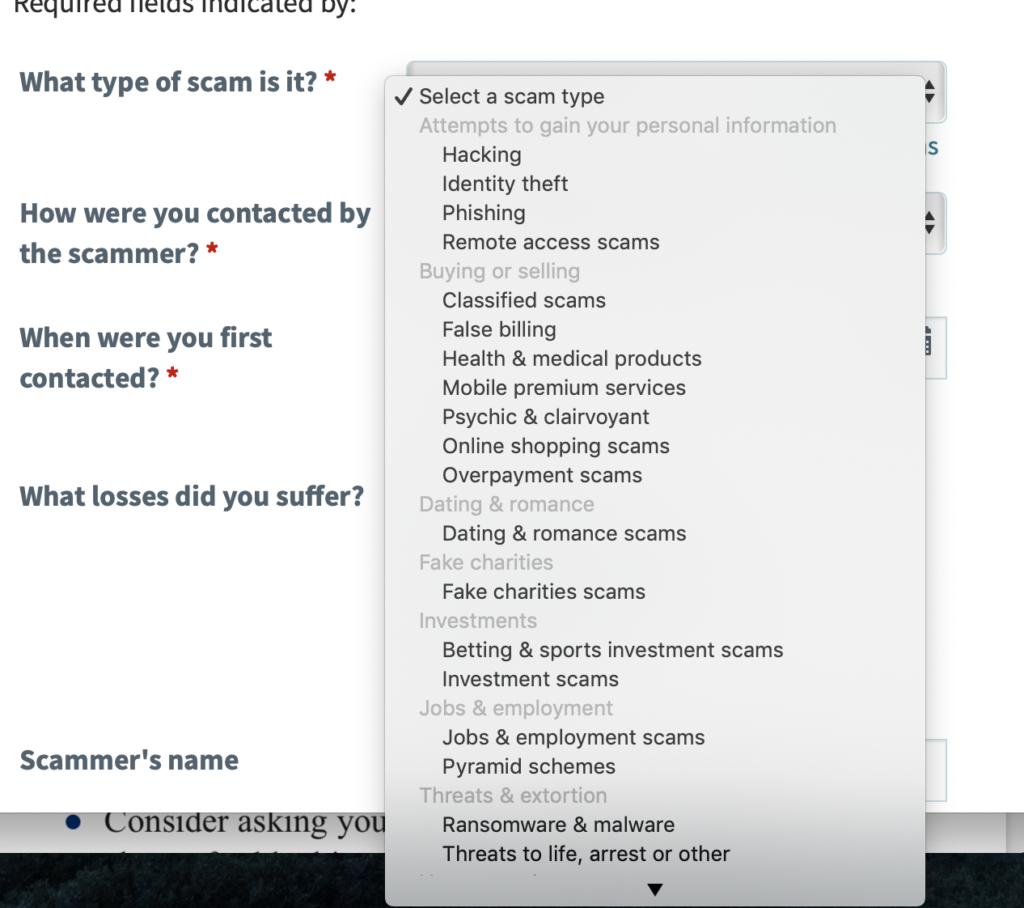

18th January 2019, was a normal day with soft wind and beautiful sunset in Alexandria, NSW. Jennifer White received a message in her mobile phone, when she wanted to order a pizza for her and friends. And that was the begining of a trouble in next weeks.
It was a message from ‘Australian customas’, and the major content of it, was that somebody else tried to smuggle drugs by using her identity information, and she needed to contact them as soon as possible.
Jennifer had never experienced such a terrible thing before, thus she just called the phone number which pasted in the message, and be informed that she need to pay 2,000 AUD fine in 48 hours before the final research report was done, or her property would be frozen and she would be sued.
‘They also said they will return the fine if I am clear.’ said Jennifer.
Without too much hesitation, the scared lady tried to tansfer her money to the scammer’s account, but one of her friends, Jane stopped her.
‘At the moment, Jane stopped me because she thought it maybe a trick, and after a while, when I calm down, I realized that she was right.’ said Jennifer, ‘we called the customas, and they told us it did not happen, I just relieve my pressure after heared that.’
It is lucky that Jennifer did not be cheated, however, according to information from the Federal Trade Commision, thousands of people lose money to telephone scams — from a few dollars to their life savings every year. Furthermore, with the development of technology, the type of scam varys a lot, scammer may use every methods to cheat people out of money.
The Australian Taxation Office scam call/ Credits: Troy Hunt
For example, as there are a lot of Chinese international studnets in Australia using WeChat, in which has a account transfer function, scammers will scam in the name of exchange.
Yuqi Fang is one of the people who were deceived by this kind of scam. 6th February 2019, she noticed a man who named ‘Oliver’ in a WeChat discussion group was publishing the information of RMB to AUD exchange.
Thought about WeChat transfer was faster than normal transfer, Yuqi contacted the man. After minutes of chat, she thought that the guy was nice and friendly, and agreed to do the exchange with him.
First time, she exchanged 500 AUD from RMB, and quickly the man sent a screenshot of transfer page to her. Everything was simple and easy. So Yuqi trusted him more, and decided to exchange 1,000 AUD.
After ‘Oliver’ sent her another screenshot, the deal was done. However, Yuqi found that she did not receive any remittance in her account. She asked Oliver, the man take the network delay as an excuse, and disappeared after a few days.
“I feel extremely terrible when I was cheated by a scammer,” said Yuqi, “I cried for a whole night.”

As the scammer once said he was in China, Yuqi reported it quickly to Chinese police. After carefully research, policeman blocked the man’s bank account, and contacted his relatives.
The scammer was going to flee to Australia, but finnally persuaded by his relatives to give himself up to police. According to his confession, he also defrauded other 3 international students for about 2,000 AUD.
“I will raise my vigilance degree after the case. Every formal transfer process set up for reasons, they are absolutely safer. ” said Yuqi Fang.
Beside scam types mentioned above, there are also many other forms, and most of them are related to network or mobile phone. The data from Australian Competition& Consumer Commission (ACCC) shows that there are about 25 major types of scam, which from online shopping scams, dating scams to taxation scams, job& employment sacms.

So how do people avoid of being cheated?
The Federal Trade Commission provide some tips to citizens.
Whenever somebody selling you any things through any methods, you need to get all information in writing before you agree to buy, so you can make an informed decision without being pressured, rushed, or guilted into it. Similarly, check out a charity before you give.
Resist pressure to make a decision immediately is always the most important thing. Also you need to keep your credit card, checking account, or Social Security numbers to yourself, and don’t tell them to callers you don’t know — even if they ask you to “confirm” this information.
If you use cash or a money transfer — rather than a credit card — you may lose your right to dispute fraudulent charges. The money will be gone. If the offer is an investment, you need to check with your state securities regulator to see if the offer — and the offeror — are properly registered. And don’t send cash by messenger, overnight mail, or money transfer.

The other thing you need to notice that is to research offers with your consumer protection agency or state Attorney General’s office, before you agree to send money. Also, don’t agree to any offer for which you have to pay a “registration” or “shipping” fee to get a prize or a gift.
Report any caller who is rude or abusive immediately, even if you already sent them money (They’ll always want more). Beware of offers to “help” you recover money you have already lost. Callers that say they are law enforcement officers who will help you get your money back “for a fee” are scammers.
Scam is a serious social problem which everybody may have suffered in their daily life, and it causes huge economic damages over Australian society. The report from ACCC display that about 6.1 million AUD losses due to crypto scam in 2018. To prevent it, people should have better understanding of different scam types and methods.
If you or people around you have been scammed, please visit Scamwatch website of ACCC or visit ftc.gov/complaint immediately to report your case,Or Call1-877-FTC-HELP directly.
Do you have any experiences of being scammed? Please share your story in the commentary area, or sent it to the mailbox of Journalist, let us discuss it together.
Journalist: Mingming Bao
Contact Me: mbao2122@uni.sydney.edu.au





Be the first to comment